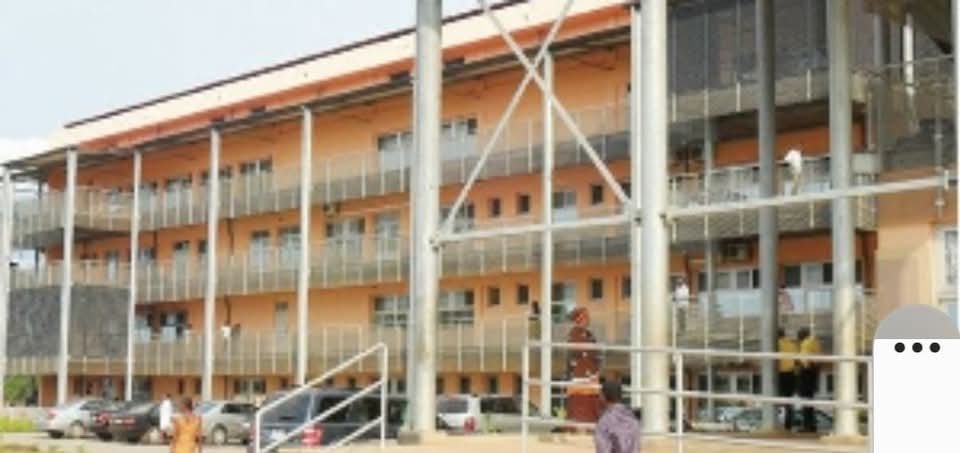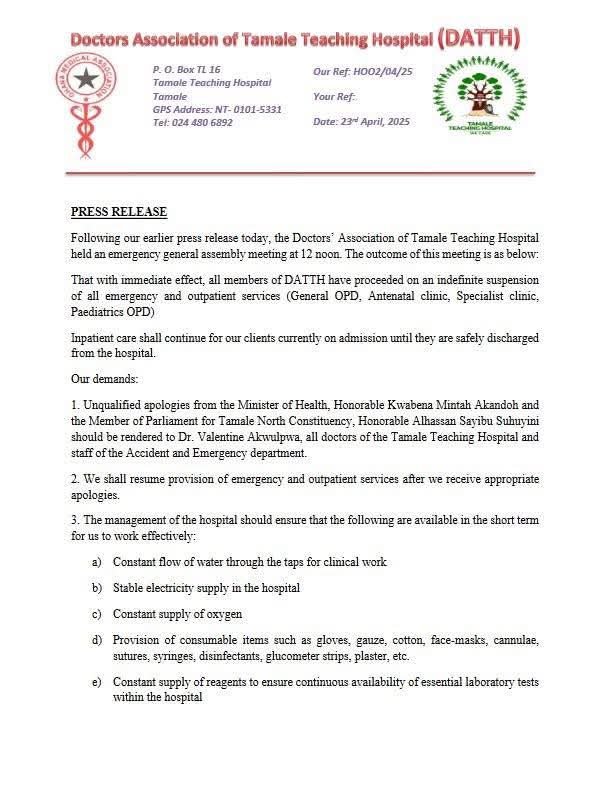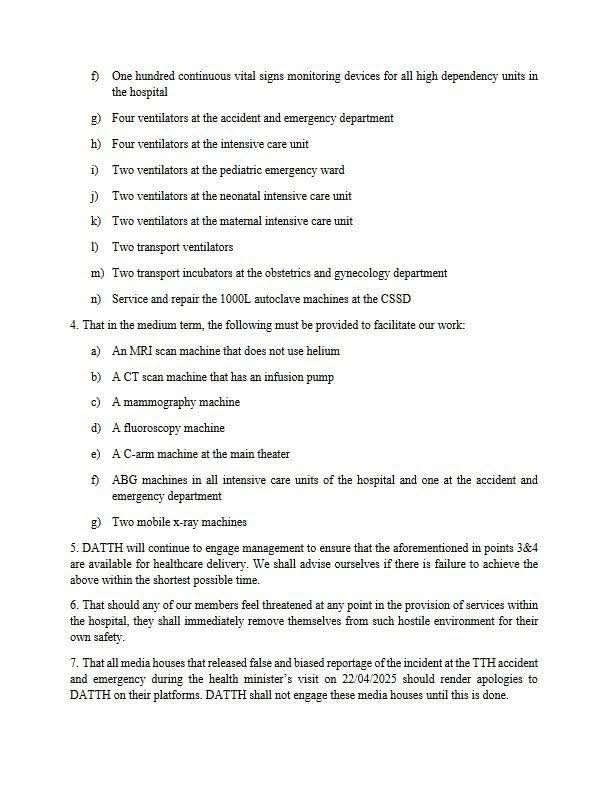News
TTH doctors declare indefinite suspension of emergency and outpatient service

Doctors at the Tamale Teaching Hospital (TTH) have declared an indefinite suspension of all emergency and outpatient services following the dismissal of the Chief Executive Officer (CEO), Dr Atiku Adam.
They have pointed to some challenging working environments that lack basic medical supplies and an insult to their dignity by top government officials.
In a statement released after an emergency general assembly meeting held at noon on Tuesday, the Doctors’ Association of Tamale Teaching Hospital (DATTH) announced that its members would no longer offer services at the General OPD, Antenatal Clinic, Specialist Clinic, and Paediatrics OPD.
Following their earlier press release, the Doctors’ Association of Tamale Teaching Hospital held an emergency General Assembly meeting at noon yesterday.
The Doctors after the meeting, demanded that with immediate effect, all members of DATTH should proceed on an indefinite suspension of all emergency and outpatient services, General OPD, Antenatal clinic, Specialist clinic, Paediatrics OPD.
This notwithstanding, they added that Inpatient Care shall continue.
Against this backdrop, they demand an unqualified apology from the Minister of Health, Kwabena Mintah Akandoh and the Member of Parliament for Tamale North Constituency, Alhassan Sayibu Suhuyini.
“We shall resume provision of emergency and outpatient services after we receive appropriate apologies,” they stated.
They further added that the management of the hospital should ensure that the following are available in the short term for them to work effectively.
Read the full statement below

News
Criminal and Seditious Libel Law was repealed in 2001 yet we still face harassment – NPP

The New Patriotic Party (NPP) has criticised the government for what it calls a return to the “culture of silence” in Ghana, despite the repeal of the Criminal and Seditious Libel Law more than two decades ago.
In a press statement issued on Wednesday, the party said the arrest and detention of its Bono Regional Chairman, Kwame Baffoe, also known as Abronye, for allegedly insulting the Inspector General of Police (IGP) was the latest sign of political intimidation.
According to the NPP, eight months into President John Dramani Mahama’s administration, state security had been “weaponised” not to fight illegal mining or protect citizens, but to intimidate and punish dissenting voices.
The party said insecurity in areas such as Bawku, Nkwanta and Gbeniyiri in the Savannah Region had claimed more than 32 lives and displaced over 50,000 people, yet the police and national security were more focused on arresting opposition supporters and social media users for their posts.
The NPP noted that Ghana abolished the Criminal and Seditious Libel Law in 2001 under President John Agyekum Kufuor to protect free speech and media freedoms.
It described the recent arrests of opposition members as an erosion of those democratic gains.
The party said it did not condone insults or vulgar language in public discourse but stressed that anyone who felt defamed should seek redress through civil defamation suits, not criminal prosecution.
It also accused the government of undermining the judiciary by “weaponising” it against political opponents, citing the removal of the Chief Justice.
“The growing climate of intimidation and criminalisation of speech is a serious assault on Ghana’s democracy,” the statement signed by NPP General Secretary Justin Kodua Frimpong said.
The NPP called on all Ghanaians to resist what it described as a return to tyranny and pledged to roll out a series of actions to protect the country’s democratic gains.
By: Jacob Aggrey
News
NIA opens Premium Centres to register children

The National Identification Authority (NIA) has started registering Ghanaian children aged between six and 14 years at all its Premium Centres across the country.
The Authority says the exercise is part of its duty to register every Ghanaian, both at home and abroad, so that all citizens can have a secure and verifiable national identity.
It explained in a statement issued today that the registration will help build a complete and inclusive National Identity Register (NIR) that captures every Ghanaian from childhood.
According to the NIA, the fee for first-time registration at Premium Centres is GHS 310, which is the approved charge for premium services.
The Authority said the requirements are the same as for applicants aged 15 years and above.
It affirmed that Parents or legal guardians were required to present either a valid Ghanaian passport of the child, the original copy of the child’s birth certificate, or be a Ghana Card holder who can vouch for the child.
The NIA also announced that from Monday, September 15, 2025, its online registration and booking system will be extended to the remaining 11 Premium Centres nationwide.
This it said will allow parents and guardians to schedule appointments more conveniently and avoid delays at the centres.
It further stated that information on the issuance of Ghana Cards for children aged six to 14 years who had already registered will be shared later.
In the coming weeks, the Authority plans to extend this registration service to all NIA District Offices to make it easier for more people to access the service.
By: Jacob Aggrey













